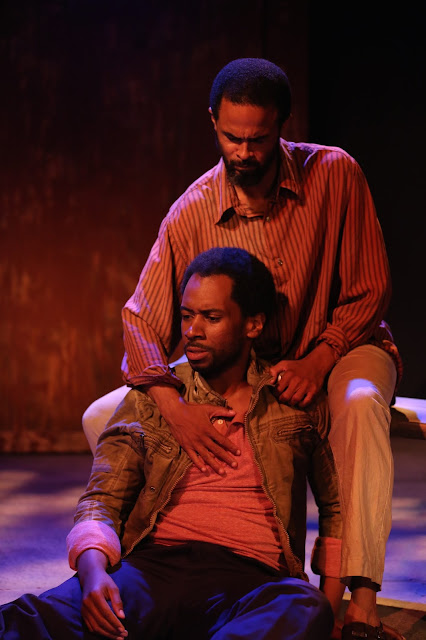"Truth or Consequences in Rwanda"


The world has witnessed many horrendous events over the
past thirty years, among the most appalling being the genocide carried out in
Rwanda by the Hutu people against the Tutsi in 1994, when over 800,000 were
slaughtered. The Rwandan horror, indelibly captured in the 2004 movie, HOTEL
RWANDA, starring Don Cheadle, is the subject of Ken Urban’s play SENSE OF AN
ENDING, now in the tiny Theater C at 59E59 Theaters, after premiering at London’s
Theatre 503 earlier this year. Unlike HOTEL RWANDA, which documents the experiences
of an actual person, SENSE OF AN ENDING declares that it “is based on the facts
of the genocide,” but “is a work of fiction.” In fact, however, the essence of the plot is loosely derived from the Belgian trial of the nuns of Sovu, held in 2001. Since the playwright has other fish to fry, his claim that the work is fiction only serves to diminish its dramatic power.
Mr. Urban’s play, while set against the backdrop of
the genocide, some of whose atrocities it describes, is more concerned with
moral issues of religious faith, truth and falsity, and forgiveness, than
historical documentation, no matter how closely what is discussed approximates its inspiration. Set in the Rwandan
city of Kigali over Easter weekend in 1999 it tells the story of two Hutu Benedictine
nuns, Sister Justina (Heather Alicia Simms), a.k.a. Bernadette, older and authoritative,
and the youthful, less worldly Sister Alice (Dana Marie Ingraham), a.k.a.
Consolata. Both are in prison awaiting transport to Belgium where they’ll be
tried for “crimes against humanity”; allegedly, they participated in a massacre
of Tutsis, who were burned to death while seeking refuge at the nuns’ church shortly after President Habyarimana,
a Hutu, died in a plane crash. Although those responsible have never been
determined, the leader’s death was considered by the Hutu an assassination by Tutsi
opposed to a peace accord with the Rwandan Patriotic Force (RPF).
A New York Times
journalist, Charles (Joshua David Robinson), who identifies himself as
African American, is there to investigate the nuns’ complicity in the killings.
The story is important to him not merely for its news value but because he, a former rising star, was the subject of a plagiarism scandal (if you
blink you’ll miss this) and wishes to write an account that will restore his
credibility and status. Leaning toward belief in the nuns’ innocence, who might
simply be scapegoats of the RPF, he finds discovering the truth to be no simple
matter; should he trust them or the RPF? The other principals are Paul (Hubert
Point-Du Jour), a uniformed Tutsi corporal in the RPF, who serves as Paul’s
cynical guide and minder, and Dusabi (Danyon Davis), the sole victim of the church massacre
to survive, whose existence has only now come into view, making him a
potentially explosive witness.
Mr. Urban provides enough political background to help
us engage with the story, but he’s really more concerned with the responses of his characters to what happened in the church. Charles’s inquiries,
which are seamlessly integrated into the episodic script as it keeps shifting
from scene to scene over a period of five days, often have him exploring his own
reactions via the small recording device he uses when interviewing his
subjects. His solo scenes with the recorder resemble soliloquies, except that instead
of speaking to himself he’s relating his thoughts to a late colleague who served
as his journalism mentor. Surprisingly, his ultimate realization of what
transpired comes to him in a vision during a muddy, surrealistic flashback
scene toward the end.
SENSE OF AN ENDING is performed within David L.
Arsenault’s evocative three-quarters round setting of four benches and a
backdrop of two huge, rusting metal doors on each of which is emblazoned a
faded cross. Hanging overhead are dozens of clothing items, suggesting the many lost lives. Travis McHale’s lighting does wonders in eliciting the play’s shifting
moods. The action jumps multiple times to different locales, but the set
remains unchanged, the doors representing those leading into the church. Inside,
we’re told, the bodies of the murdered Tutsis have been allowed to remain just
as they were when they were killed. I’ve no idea about whether anything like
this existed in Rwanda five years after the horrors, but it’s hard to accept
the presence of hundreds of decomposing bodies allowed to remain in situ for so
long in central east Africa.
SENSE OF AN ENDING is not an exposé or questioning of
previously unknown or disputed historical events; we don’t learn anything new
about the particular issues that provoked the enmity between the Hutus and the
Tutsis, although we see that moral ambiguities exist on both sides of the
divide. The case of the nuns is to be decided in a foreign court, not in a New York Times article, so Charles’s
investigation, which essentially suggests that he’s setting himself up as judge
and jury, might be considered inappropriate, but the issue never arises; since
the case itself is a manufactured one, the play, for all the magnetism inherent
in its subject matter, fails to stick. The fact that the sisters aren't represented by a lawyer makes the legality of their situation even vaguer.
Director Adam Fitzgerald squeezes everything possible
out of the small space’s limitations, and his actors are all solid, if
unexceptional. Mr. Urban deserves kudos for attempting a play on such a significant
topic, even if the play gains more of its power from its subject matter than
the way that subject matter is expressed.
OTHER VIEWPOINTS:
59E59 Theaters
59 East 59th Street,
Through September 6





